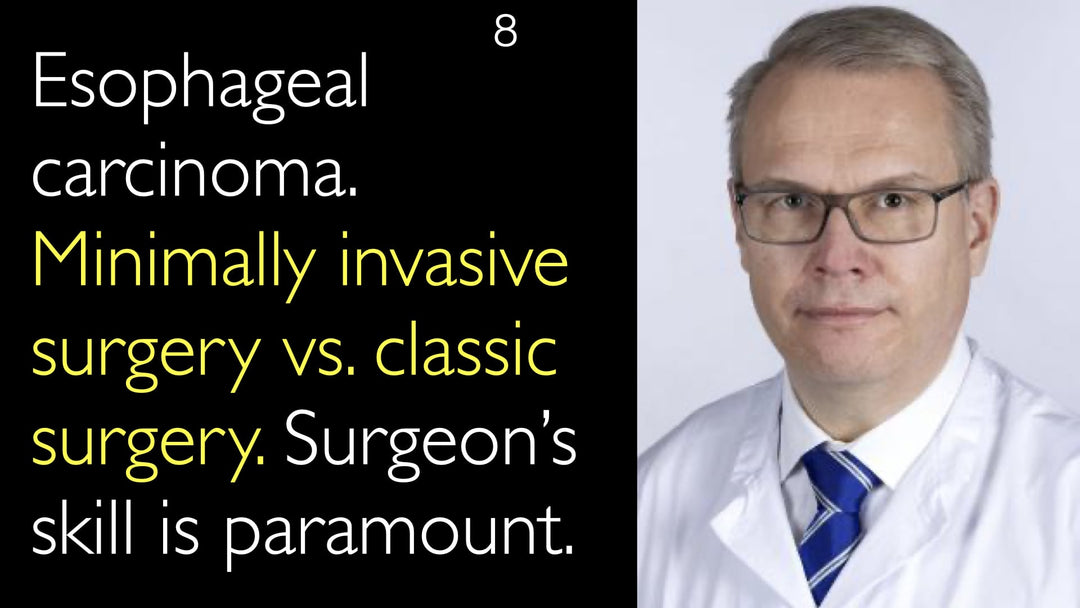食道癌手術の第一人者であるJari Rasanen医師(医学博士)が、低侵襲食道切除術が患者の予後をどのように改善するかについて解説します。手術手技を詳細に説明し、従来の開腹手術との比較を行います。Jari Rasanen医師は、手術の成功には外科医の技術と経験が最も重要であると強調しています。また、低侵襲アプローチにより呼吸器および循環器の合併症が大幅に減少する点についても論じます。長期生存率は同等である一方、低侵襲手術後は生活の質(QOL)が向上することが多いとされています。
低侵襲食道切除術:技術、治療成績、外科医の専門性
セクションへ移動
食道癌における外科的治療の有効性
Jari Rasanen医学博士は、手術が依然として食道癌の根治的治療の基本であると確認しています。同博士は、良好な手術成績を得るためには、患者にとって安全な処置が不可欠であると述べています。専門施設では、食道切除術後の5年生存率は50%を超えるべきとされています。また、化学療法や化学放射線療法の進歩は重要ではあるものの、これらは手術を補完するものであり、代替するものではないと指摘しています。
低侵襲手術技術の定義
低侵襲食道切除術では、大きな切開を小さなキーホール開口部に置き換えます。Jari Rasanen医学博士によれば、腹部では開腹術が腹腔鏡下手術に、胸部では開胸術が胸腔鏡下手術にそれぞれ置き換えられます。この手法により、外科医は開腹手術と同等の腫瘍学的処置を実施可能です。身体的侵襲を抑えつつ、同じ癌切除目標を達成するように設計されています。
手術種類の患者選択基準
Jari Rasanen医学博士は、ほとんどの食道癌症例が低侵襲アプローチに適していると示唆しています。ただし、決定は疾患の特性だけに基づくものではなく、外科医の技術習熟度と専門性も重要な要素です。第一の目標は、常に個々の患者にとって最も安全で効果的な手術を実施することにあります。
外科医の技術の極めて重要な重要性
Rasanen博士は、低侵襲食道手術が術者への依存度が非常に高いことを強く強調しています。外科医の経験が最適な手術アプローチを決定する最も重要な因子です。同博士は、低侵襲技術に関する十分な経験がない外科医の場合、開胸食道切除術を選択することが安全な判断であると助言しています。これにより患者の安全性が優先され、予防可能な合併症の回避につながります。Anton Titov医学博士とRasanen博士は、外科医の技術に適している場合、開腹手術が依然として完全に実行可能であり、しばしば望ましい選択肢であることに合意しています。
長期手術成績の比較
開腹手術と低侵襲食道切除術の全生存率は非常に類似しているとされています。Jari Rasanen医学博士は、低侵襲アプローチにわずかな生存利益を示す研究を引用していますが、患者選択やその他の交絡因子が結果に影響を与える可能性があると警告しています。手技が適切に実施された場合、局所再発率を含む腫瘍学的有効性は同等です。
短期および長期のQOL(生活の質)利益
低侵襲食道切除術の短期的利益は十分に確立されており、顕著です。Jari Rasanen医学博士は、術後肺合併症の大幅な減少を強調しています。患者はまた、低侵襲手術後により少ない疼痛を経験し、入院期間も短縮されます。心血管合併症の発生頻度も開腹手術に比べて低くなります。同博士は、患者は短期・長期的の両方で良好な経過を示すことが多く、低侵襲手術後の長期QOLの優位性を示す研究もあると結論付けています。
全文書き起こし
Anton Titov医学博士: 癌の外科的治療の有効性はあなたの研究関心の一つです。アウトカム研究において、食道癌に対する外科的治療はどの程度有効ですか?さらにどのように改善できますか?
Jari Rasanen医学博士: 化学療法と化学放射線療法には多くの進展がありましたが、大多数の外科医と医師は、手術が依然として食道癌の根治的治療の基本的部分であることに同意していると考えます。もちろん、手術は患者にとって安全でなければなりません。
当施設で安全性を高めるために行ってきたことの一つは、2009年から低侵襲食道手術を使用していることです。これにより、特に肺合併症の数を減少させました。これが患者にとって手術を安全にしています。
一方、優れた外科センターでの成績は、専門施設であれば手術後少なくとも50%超の5年生存率を示すべきです。
Anton Titov医学博士: Rasanen教授、低侵襲食道癌手術とは何ですか?従来のアプローチとどのように異なりますか?食道癌において、患者が低侵襲手術と従来式アプローチのどちらを受けるべきかどのように決定しますか?
Jari Rasanen医学博士: 食道手術における低侵襲手術は、すべての手術において同じ意味を持ちます。腹部では大きな切開である開腹術を腹腔鏡下手術に置き換え、胸部では大きな開胸術を胸腔鏡下手術に置き換えます。
小さなキーホールのみを作成し、それらの穴を通じて開腹手術と同じ処置を実施できます。したがって、基本的にほとんどの食道癌症例は低侵襲手術に適しています。
外科医が低侵襲手技を実施できるか、または開胸食道切除術をより良く行えるかどうかは、外科医の経験に依存します。これは非常に重要です:食道手術と肺癌手術における低侵襲アプローチは術者依存性が極めて高いのです。
外科医が低侵襲手術に関して十分な経験と技能を有さない場合、一部の患者では従来式アプローチで手術を実施することがより良いかもしれません。
Anton Titov医学博士: まさに、それは外科医の経験に大きく依存します。外科医が低侵襲手術に関する多くの経験を有さない場合、開腹手術を実施し、経験不足による低侵襲手術中の合併症を回避することがより良い選択肢であることに完全に同意します。したがって、基本的に、外科医が開腹手術により慣れている場合、開腹手術は依然として実行可能な選択肢であると考えます。
Anton Titov医学博士: 食道癌に対する低侵襲アプローチとより従来式のアプローチを比較した場合、長期成績はどのように見えますか?局所再発率は同じですか?異なりますか?患者の長期QOL(生活の質)についてはどうですか?短期転帰は低侵襲食道手術の方がはるかに良好であることは承知しています。しかし、長期転帰についてはどうですか?
Jari Rasanen医学博士: 全生存率は、開腹手術後と低侵襲手術後でほぼ同じであるようです。一部の研究では、食道手術と肺手術の両方において、低侵襲手術後の全生存率が開腹手術後よりわずかに良好である可能性を示しています。しかし、それが患者選択や他の交絡因子に依存するかどうかを判断することは非常に困難です。
したがって、主要な点は、特に短期間のQOLが低侵襲手術後の患者でより良好であることだと考えます。一部の研究では、長期QOLも低侵襲手術後に優れていることを示しています。
患者は疼痛に著しく苦しむことが少なく、より短い期間の入院を要します。また、低侵襲手術後は心血管合併症も少なくなります。したがって、患者は低侵襲手術後、短期および長期的の両方で経過がはるかに良好です。




